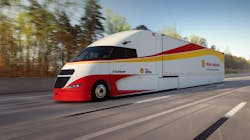Shell Starship 2.0 increases freight-ton efficiency by 3.5 times N.A. average
The results are in, and Shell Starship 2.0 achieved 254 ton-miles per gallon for freight ton efficiency on its cross-country trek from San Diego to Jacksonville, Florida, according to Shell. This was a 3.5 times improvement over the North America average freight ton efficiency for trucks which is 72 ton-miles per gallon. The first Starship run over the same route in 2018 yielded a freight ton improvement of 2.48 over the North American average. Both trips were monitored and verified by the North American Council for Freight Efficiency.
According to NACFE, freight ton efficiency is the most relevant statistic for judging the energy intensity associated with moving cargo from point A to point B since it combines the weight of cargo being moved with the amount of fuel consumed. Shell Starship 2.0 achieved a 10.8 MPG on its cross-country run as compared to the 8.94 achieved by Starship 1.0 and the 6.4 MPG North American fleet average MPG. These numbers are made even more significant given Shell Starship 2.0 beat the 178 ton-miles per gallon for freight ton efficiency achieved in 2018 while carrying an 18% increase in payload, from 39,900 pounds of clean reef material in 2018 to 47,100-pounds this year.
“With increasing efforts to decarbonize road freight, we saw an opportunity to further demonstrate that the use of today’s efficient technologies can offer significant benefits to fleets,” said Jeff Priborsky, Global Marketing Manager for the On-Highway Fleet Sector, Shell Lubricant Solutions. “Understanding that not all fleets run fully loaded from coast-to-coast we felt it was important to conduct a variety of tests to provide additional data that can show how trucking efficiencies work in different conditions, in order to provide tangible benefits to the freight transport industry.”
The Shell Starship program exceeded its 2018 results in its second cross-country run by using updated energy-efficient technologies, such as the Cummins 2020 X15 engine ( EX Efficiency Series; 400-hp; 1,850 ft.-lbs. torque ) paired with the Eaton Cummins Endurant transmission, to demonstrate what could be achieved driving a Class 8 truck in real-world conditions. The truck was designed to draw together these technologies in a single vehicle crafted to optimize performance and efficiency.
Following the initial program in 2018, the Shell Lubricants Solutions and Shell Technology teams worked together to pair the learnings from the first run with recent advancements in technology to develop the Shell Starship 2.0 truck. The new truck features a new chassis and drivetrain, along with new safety and fuel-efficient upgrades while maintaining the bespoke body from the original truck.
A second, shorter 400-mile evaluation run was conducted to provide additional data about its freight ton efficiency and fuel economy benefits. The short haul evaluation was completed in North Carolina with a cargo weight of 17.5 tons which was chosen to reflect more typical payload, commonly used by many fleets. The average fuel economy obtained was 12.0 mpg and the freight ton efficiency value was 210 ton-miles per U.S. gallon. While both values are direct consequences of the reduction in cargo mass, these are significant numbers when compared to the U.S. average of 6.4 mpg and 72 ton-miles per gallon. The fuel mileage is almost double the U.S. average and the ton-miles is more than triple.
“The efficiency testing with different payloads and miles driven demonstrate that efficient technologies have significant benefits for long-haul and shorter regional-haul applications,” said Robert Mainwaring, Technology Manager for Innovation, Shell Lubricants. “Fleets and owner-operators can evaluate which technologies are most beneficial for them and pursue them today to find significant fuel savings and carbon emissions reductions.”
